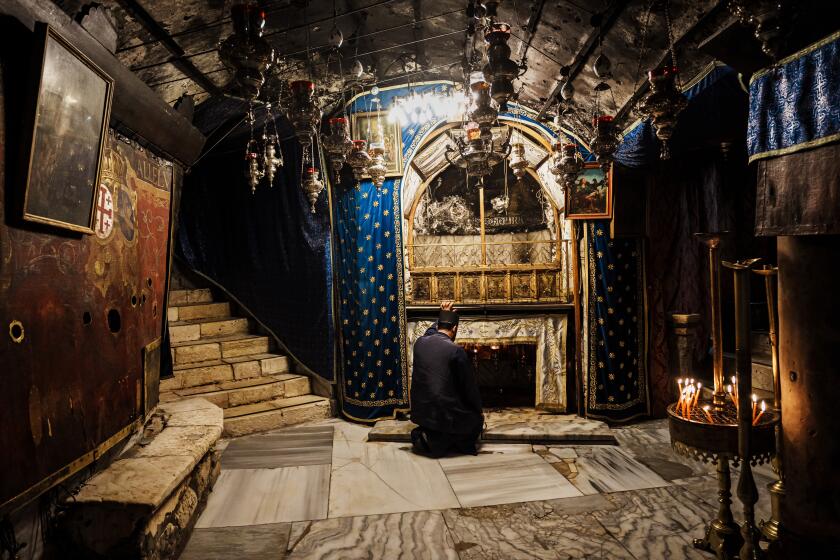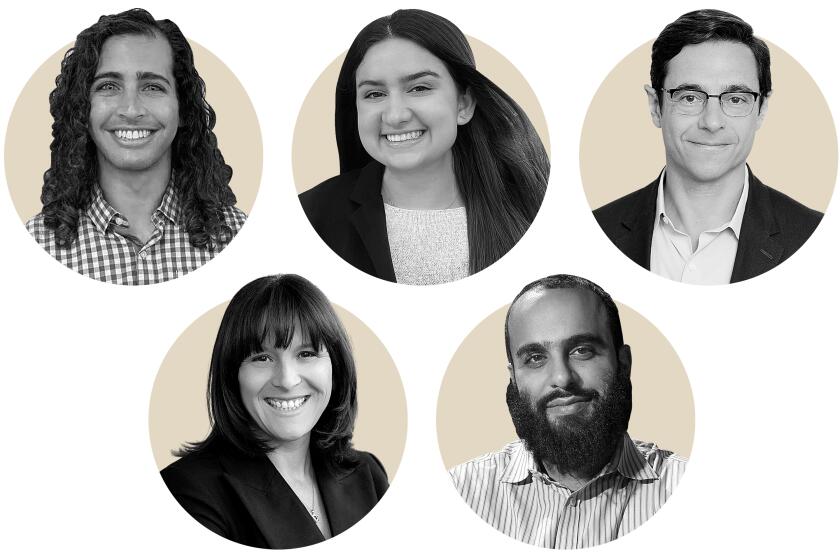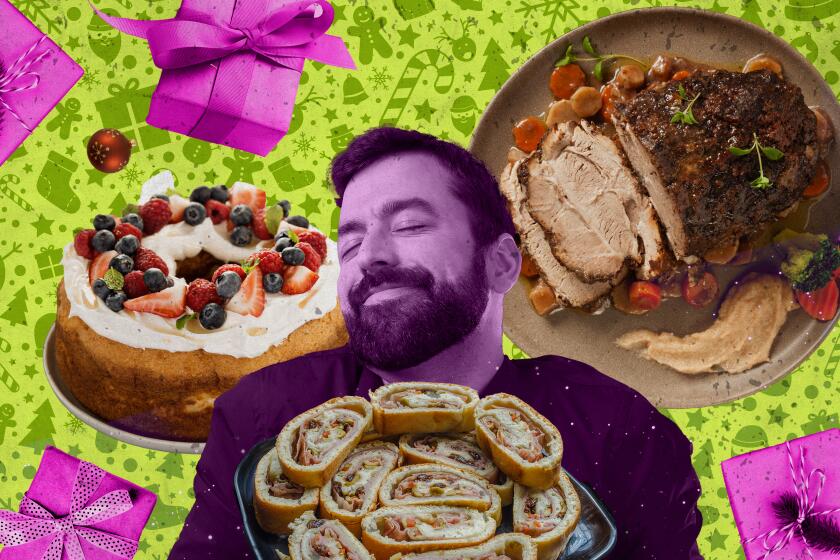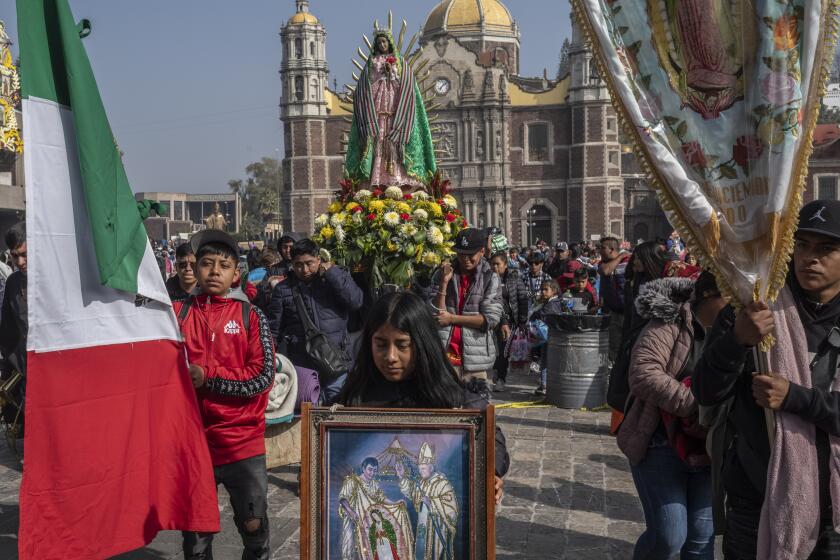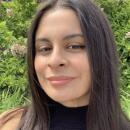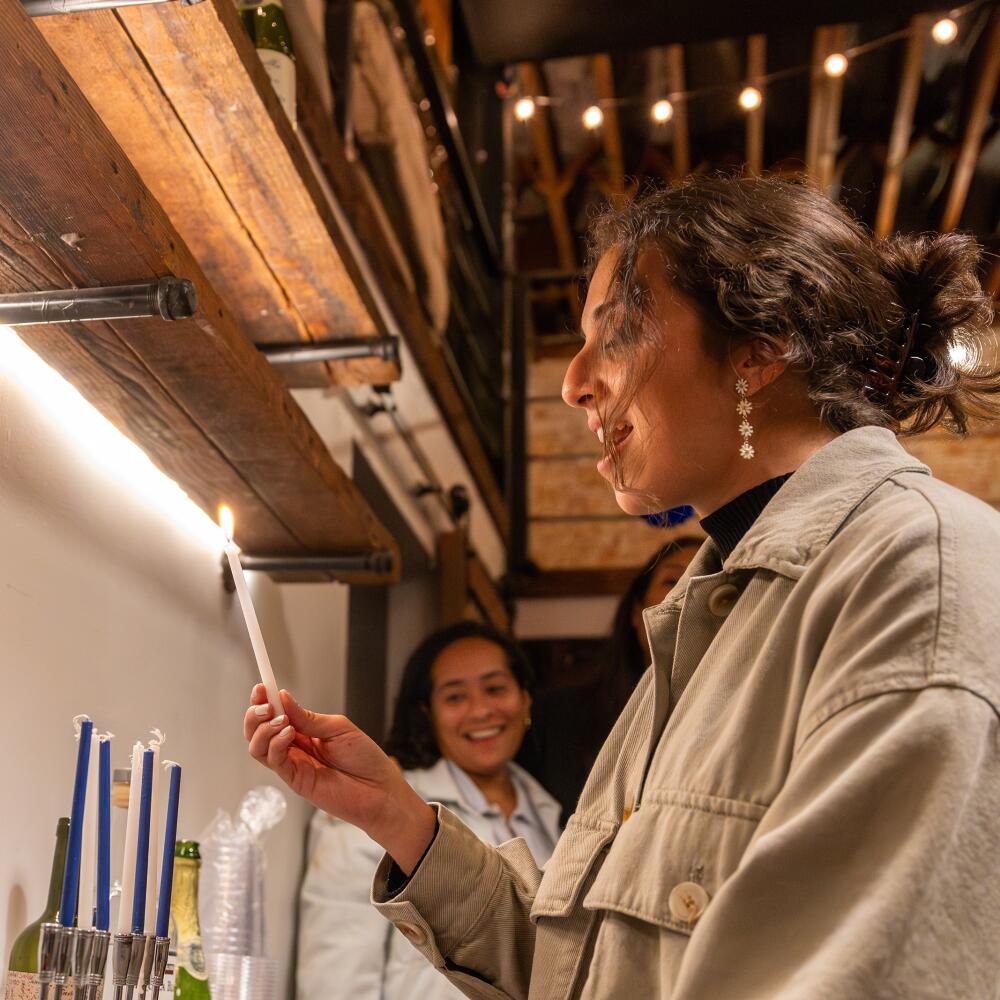
- Share via
When Nate Looney was younger he used to grab his mother’s passport to prove to naysayers that she was really from Panama, but it took him years to embrace his Jewish identity. Now, Looney moves through the world without the need for receipts to prove he is both Afro-Latino and Jewish.
“All of those things can exist in one person,” Looney said.
In a time of increased hate crimes towards Jewish people and their communities, Looney’s multiple identities allow him to understand the layers of discrimination that permeate day-to-day life.
“Racism still exists. For Latino Jews and Jews of color we’re dealing with multiple ‘isms,’” Looney said.
In Bethlehem, the West Bank town revered as Jesus’ birthplace, Christmas is all but canceled, in solidarity with Palestinians’ suffering in Gaza.
Looney’s mother was born in Panama by way of Jamaica, which is home to Kingston’s Shaare Shalom Synagogue , one of five sand floor synagogues in the world.
“The reason why it had a sand floor is to absorb sound so people that were antisemitic wouldn’t know there was praying going on in the synagogue,” Looney said.
Dutch Sephardic Jews first settled in the Caribbean island of Curacao, a tiny island 35 miles off the coast of Venezuela, to escape antisemitism in Europe. There, they established the oldest surviving synagogue in the Americas, the Mikve Israel-Emanuel Synagogue.
According to the Brandeis Initiative on the Jews of the Americas, there are over 750,000 Latin American Jews, and about half of them live in the United States. A 2021 Pew analysis found that roughly 4% of all U.S. Jews identify as Hispanic.
The Times gathered a panel of Jewish thinkers to talk about recent incidents and help define what antisemitism is and what antisemitism isn’t.
Navigating both ethnic and religious identities can be a complex journey for Latino Jews, who often find themselves on the margin of each space.
While it once seemed difficult for Looney to find a community of other Latino Jews he, along with 40 other Jews of color, gathered at a Hollywood home to celebrate the seventh day of Hanukkah.
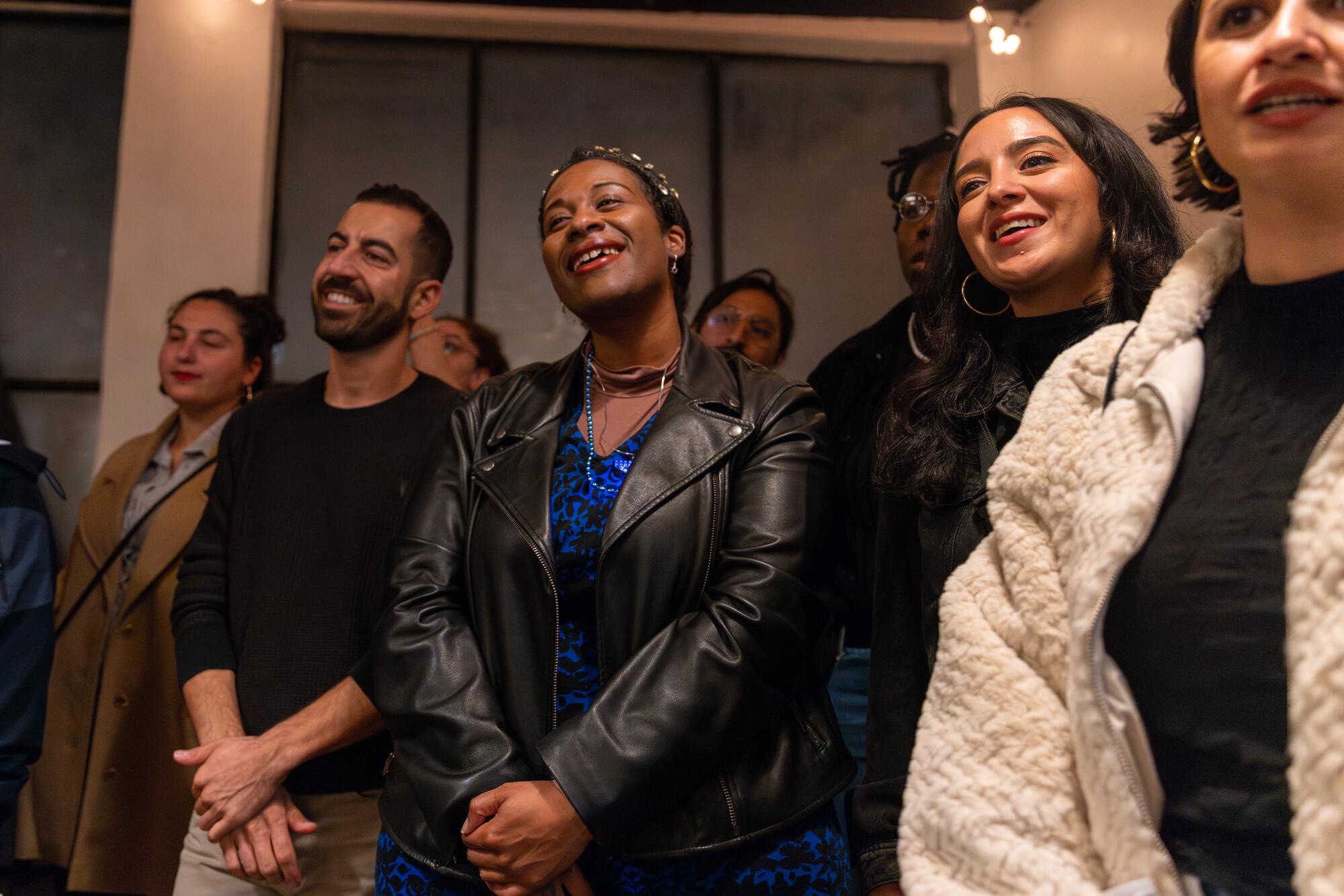
Light blue dreidels, chocolate coin “gelt” and fried churro waffles set the scene at the Ilumina Jews of Color Hanukkah which was part of NuRoots’ Infinite Light Hanukkah festival, an organization that helps affinity groups host Hanukkah gatherings. The event was hosted by Jewtina y Co., a nonprofit organization that celebrates and nurtures Latin-Jewish identity.
“Jewtina helped to bridge that connection between my Jewish identity and my Latin roots,” Looney said.
Analucía Lopezrevoredo created Jewtina y Co. in 2019 for Latino Jews living in the U.S., whom she labels as the “double diaspora” in her training as a sociologist.
“I am showing up with both of those identities all the time, I don’t get to separate them. They’re not fragmented. They inform everything that I do,” Lopezrevoredo said.
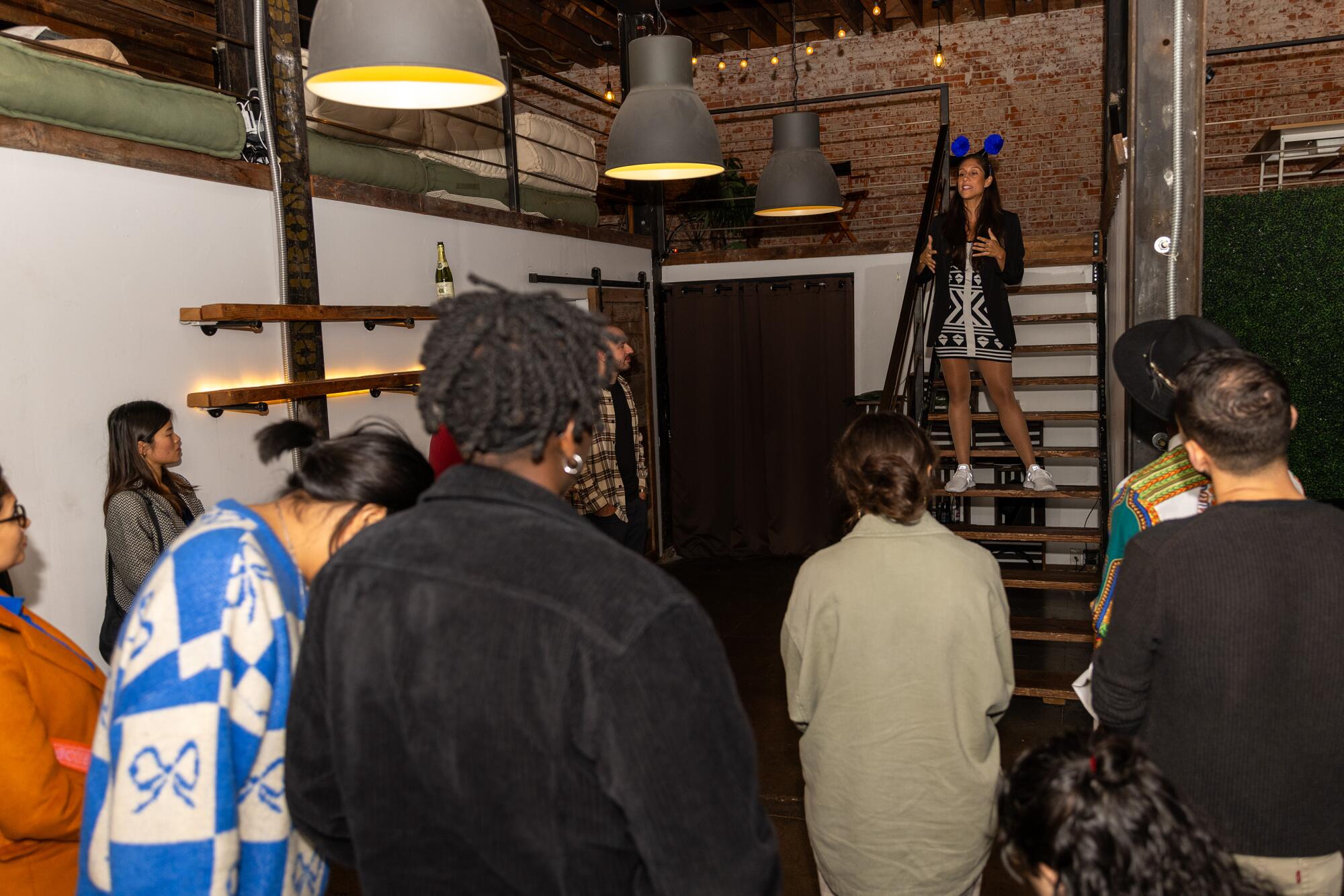
As Peruvian Chilean American Jew, Lopezrevoredo always yearned for a community where both her Latina and Jewish identities could exist simultaneously.
“We are tres leches babka, we are spicy matzo ball soup, platano latkes, yucca latkes. We are continuously expressing life at those two intersections,” Lopezrevoredo said.
Maia Ferdman believes there is something special about sharing the space with other Latino Jews. She just returned from Argentina, where she spent a year retracing her Jewish lineage in the country back to the 1890s.
For Ferdman, it’s not a matter of picking between her Argentinian, American and Jewish identities.
Warm up with a drink with Mayan origins, sing along to a gaita from Venezuela, and delight with a flancocho from the Dominican Republic.
“Soy de aquí, y soy de allá. I am from here, and I am from there, and I can be both,” Ferdman says.
That idea of duality and multiplicity existing as one was the central theme at the Jews of Color Hanukkah gathering, an event exclusively for people who identify as Black, Latino/x, Asian, Sephardic and/or Mizrahi.
“We can’t know the value and brightness of light if we don’t have this darkness,” Lopezrevoredo shared with the group.
This year, Jewish individuals celebrated Hanukkah during a time of conflict between Israel and Hamas.
This moment in the Israel-Hamas saga can be glimpsed in the fate of two fathers, strangers who share misfortunes brought on by larger powers and are now left to find their way
On Oct. 7, Hamas militants killed at least 1,200 Israelis and took 240 people hostage. Israel then launched attacks on the Gaza Strip, which have killed nearly 20,000 Palestinians while also displacing some 1.9 million others and flattening the northern part of the territory, according to the latest Associated Press report.
“I know this is a very different Hanukkah than we experienced last year,” Lopezrevoredo shared with the group.
Lopezrevoredo believes everyone is losing in the context of war right now and dialogue is crucial.
“It’s so important for us as a community that thrives around difference to be able to talk and engage in conversation across differences, which isn’t always easy,” Lopezrevoredo said.
Mandas, dances and rain: This year’s Feast of Our Lady of Guadalupe attracted millions to Mexico City
Ecclesial communities, entire families and neighborhood groups begin arriving at the Basilica in the first days of December to fulfill their mandas.
“There’s so many things that touch people so differently and we don’t run away from those hard conversations … If we are to be as rich as we want to be in terms of diversity, that’s also one of the things that we are going to be diverse about,” Lopezrevoredo said.
That richness in perspective rings true for Guatemalan Jew Rebeca Orantes, who is a third-year rabbinical student at Hebrew Union College.
“People in [Latin American] countries experience high levels of stress due to violence, due to corruption. … All those different things, at the end of the day, add up to our need to believe in something higher than ourselves that’s taking care of us,” Orantes said.
Orantes, as she lit the seventh candle, has leaned into her strong Latin American Jewish faith this Hanukkah.
Now with the ongoing Israel-Hamas war, Orantes’ feelings around Hanukkah have become complicated.
“It’s a heavy Hanukkah for me,” Orantes said. “I’m not going to lie.”
More to Read
The Latinx experience chronicled
Get the Latinx Files newsletter for stories that capture the multitudes within our communities.
You may occasionally receive promotional content from the Los Angeles Times.
